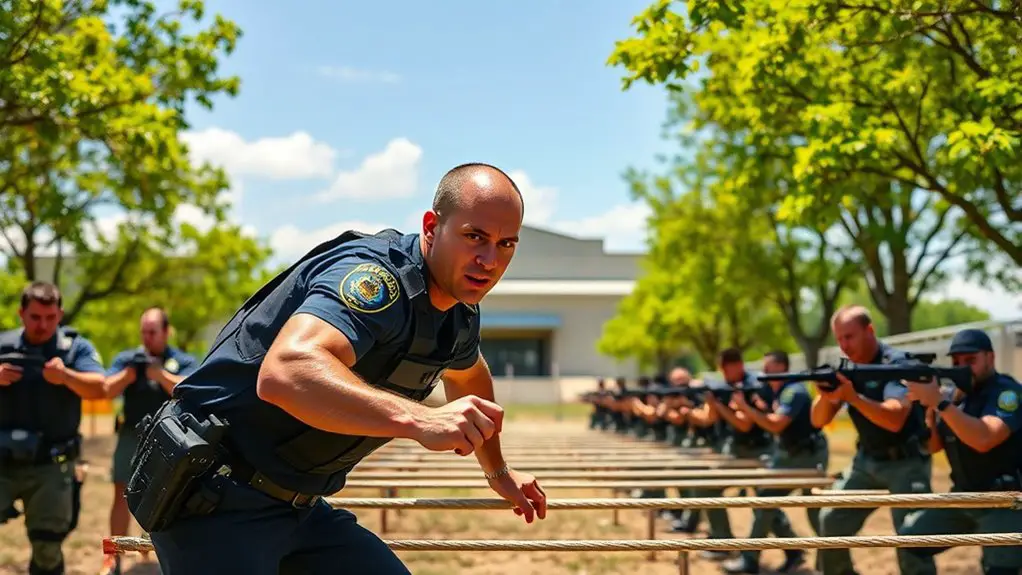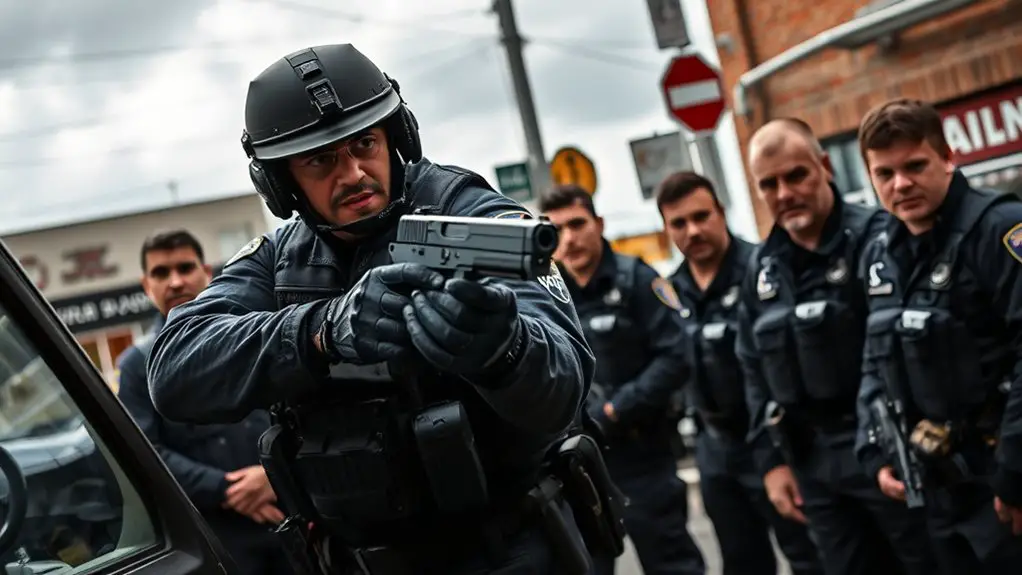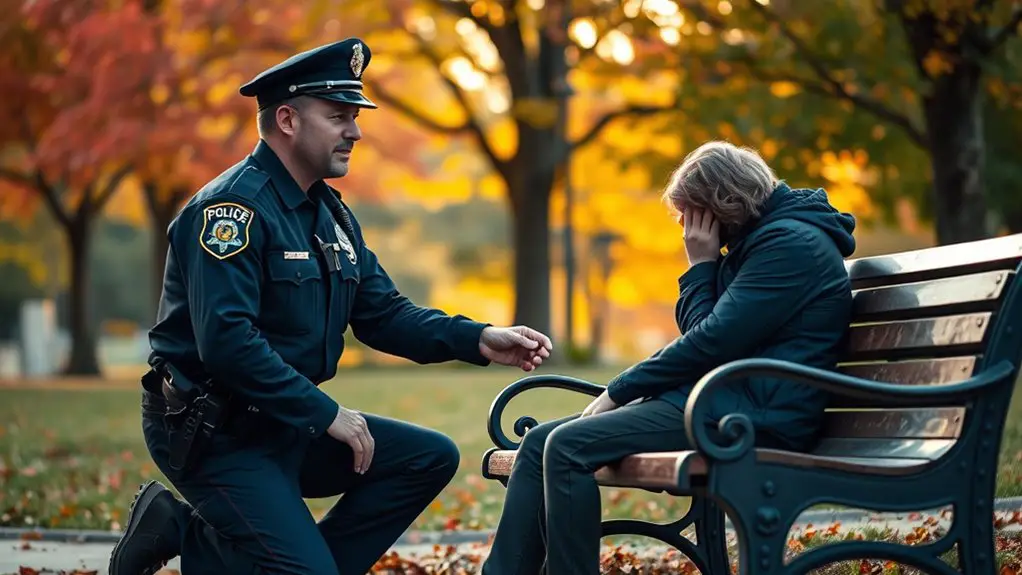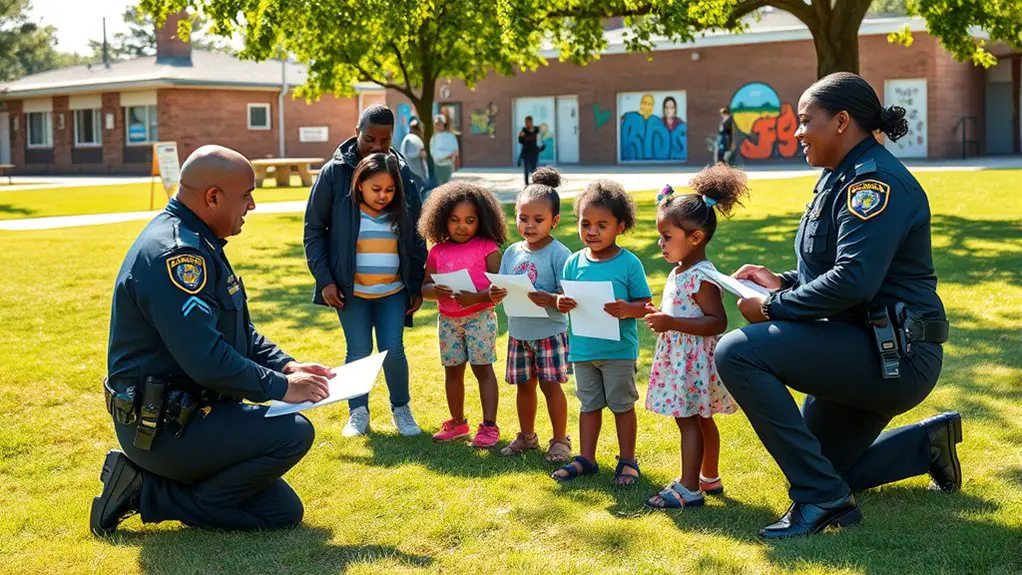How Police Officers Should Train for Job Performance

To train effectively for job performance, you should engage in scenario-based training that mirrors real-world situations. Focus on honing your communication skills, especially in de-escalation and active listening. It’s also essential to understand mental health signs to manage crises better. Embracing technology can enhance your capabilities, while community engagement helps build trust. Don’t forget the importance of continuous professional development and feedback to adapt to evolving challenges. Discover what more you can do to excel in your role.
Scenario-Based Training: Real-World Applications

Scenario-based training is one of the most effective methods to prepare police officers for real-world situations they’ll face on the job. By engaging in tactical simulations, you can develop critical skills needed to respond effectively in high-pressure environments. These training sessions put you in real life scenarios that mimic potential incidents, allowing you to practice decision-making, tactical responses, and teamwork.
In these simulations, you’ll encounter various challenges, from traffic stops to active shooter situations, which can greatly enhance your problem-solving abilities. This hands-on approach not only builds your confidence but also reduces the likelihood of mistakes when it truly matters. You’ll learn how to assess threats quickly and prioritize safety for yourself and the public.
Ultimately, scenario-based training equips you with the tools to react decisively and responsibly, ensuring the safety of the community you serve while preparing you for the unpredictable nature of police work.
Emphasizing Communication Skills
Effective communication can make all the difference in police work. By honing your active listening techniques and mastering conflict resolution strategies, you can diffuse tense situations and build trust with the community. Let’s explore how these skills can enhance your overall job performance.
Active Listening Techniques
While responding to a call, you might find that active listening is just as important as physical skills in law enforcement. By honing your communication abilities, you can build trust and guarantee safety for everyone involved. Start with active listening exercises, focusing on fully engaging with the speaker. Maintain eye contact, nod, and use affirming gestures to show you’re paying attention.
Incorporating feedback techniques is essential, too. Repeat back key points to confirm understanding and ask clarifying questions when needed. This approach not only helps you gather crucial information but also reassures the person that their concerns are heard. Remember, effective communication can diffuse tense situations and foster cooperation, making your job—and the community’s safety—much easier.
Conflict Resolution Strategies
When tensions rise during a conflict, your ability to communicate effectively can be the key to resolution. Utilizing negotiation tactics and mediation techniques can defuse volatile situations. Focus on active listening, validating feelings, and remaining calm. Here’s a quick reference table to enhance your approach:
| Strategy | Description | Benefits |
|---|---|---|
| Active Listening | Hear and reflect on what’s said | Builds trust and rapport |
| De-escalation Tactics | Use calming language and posture | Reduces anxiety and hostility |
| Collaborative Problem-Solving | Work together for solutions | Fosters cooperation |
| Empathy | Understand others’ perspectives | Enhances connection |
Mental Health Awareness and Crisis Intervention

When you’re on the job, recognizing signs of mental health issues can be essential. It’s important to understand how to effectively use crisis de-escalation techniques to help those in distress. By honing these skills, you can make a significant difference in your interactions with the community.
Recognizing Mental Health Signs
Recognizing mental health signs is essential for police officers, as it empowers them to respond effectively during crises. Being aware of mental health indicators, such as sudden mood changes, withdrawal, or erratic behavior, can help you assess a situation quickly. Understanding these signs allows you to prioritize safety for both yourself and the individuals involved. Additionally, stress management techniques should be integrated into your training. By developing skills to manage your own stress, you can remain calm and composed, which is vital when interacting with those in distress. Ultimately, equipping yourself with this knowledge not only enhances your performance but also fosters a safer environment for everyone during critical incidents.
Crisis De-escalation Techniques
Understanding mental health signs lays the groundwork for effective crisis de-escalation techniques. When you engage with individuals in distress, your situational awareness becomes essential. By evaluating the environment and the person’s behavior, you can tailor your approach to guarantee safety for everyone involved. Role playing exercises can greatly enhance your skills, allowing you to practice scenarios that may arise in real life. These exercises help you develop empathy and effective communication strategies, making it easier to connect with those in crisis. Remember, it’s important to remain calm and composed, as your demeanor can influence the situation. By combining mental health awareness with practical training, you’ll be better equipped to handle challenging encounters and promote safety and well-being.
Embracing Technology in Law Enforcement
As technology continues to evolve, law enforcement agencies must adapt to stay effective and relevant. Embracing innovations like data analytics and virtual reality can greatly enhance training and operational efficiency.
Here’s a quick overview of how these technologies can impact law enforcement:
| Technology | Benefits |
|---|---|
| Data Analytics | Informed decision-making |
| Virtual Reality | Realistic training scenarios |
| Body Cameras | Transparency and accountability |
| Drones | Enhanced surveillance |
| Mobile Apps | Improved community communication |
Community Engagement and Building Trust

Building trust between law enforcement and the community is essential for effective policing. When officers engage with residents, it fosters a sense of safety and cooperation. You can enhance this relationship through community partnerships that promote open communication and collaboration. By participating in local events, officers can show they’re approachable and committed to serving the community’s needs.
Trust building initiatives, like neighborhood patrols or youth programs, help bridge gaps and create understanding. These efforts not only enhance safety but also empower residents to share concerns and work together with law enforcement. When you invest in these initiatives, you’re not just enforcing the law; you’re building a foundation of trust that encourages proactive crime prevention.
Ultimately, a strong bond with the community leads to safer neighborhoods and a more effective policing strategy, ensuring everyone feels valued and protected.
Continuous Professional Development and Evaluation
A strong relationship with the community lays the groundwork for ongoing professional development and evaluation for police officers. When you engage with the community, you gain valuable insights that inform your training needs. Regular professional feedback from your peers, supervisors, and community members is essential for honing your skills and ensuring you’re meeting public safety expectations.
Ongoing assessments are vital in identifying areas for improvement and reinforcing effective practices. These evaluations can take many forms, from performance reviews to community surveys, and should be integrated into your routine. By embracing a culture of continuous learning, you can adapt to the evolving challenges of policing, ensuring you’re always equipped to serve the community effectively.
Ultimately, prioritizing professional development and evaluation not only enhances your capabilities but also fosters trust and safety within the community you protect. Staying committed to growth makes all the difference in your role as a police officer.
Frequently Asked Questions
What Physical Fitness Standards Must Police Officers Meet During Training?
To meet physical fitness standards during training, you’ll focus on endurance training and strength requirements. It’s vital to develop cardiovascular endurance through activities like running or cycling, ensuring you can handle high-stress situations. Additionally, strength requirements often include exercises like push-ups, sit-ups, and weightlifting to build muscle resilience. By meeting these standards, you’ll enhance your ability to respond effectively in challenging scenarios, ultimately ensuring not just your safety, but that of the community you serve.
How Often Do Officers Undergo Training Refreshers?
“Practice makes perfect,” and that’s why officers undergo training refreshers regularly. Typically, you’ll find they participate in skill enhancement sessions at least once a year, but some departments opt for more frequent training. This training frequency guarantees they stay sharp and effective in their duties. By continually honing their skills, officers can better protect and serve the community, providing the safety you deserve and expect from law enforcement.
Are There Specialized Training Programs for Different Police Units?
Yes, there are specialized training programs for different police units. If you’re in a tactical unit, you’ll likely undergo rigorous tactical training that focuses on high-pressure scenarios and advanced techniques. These programs are designed to guarantee officers can respond effectively to various situations, enhancing public safety. Specialized units, such as SWAT or K9, receive tailored training to meet their unique operational needs, guaranteeing officers are well-prepared and equipped for their specific roles.
What Role Does Diversity Training Play in Police Officer Preparation?
Diversity training’s like a bridge connecting two worlds—one where misunderstandings thrive, and another where cultural competence flourishes. In your role as an officer, understanding implicit bias is vital; it helps you interact more effectively with diverse communities. When you embrace this training, you’re not just enhancing your skills; you’re fostering trust and safety. Ultimately, it’s about creating a community where everyone feels respected and protected, making your job more impactful and rewarding.
How Do Officers Receive Feedback on Their Performance During Training?
Officers receive feedback on their performance during training through performance evaluations and training assessments. These evaluations help you identify strengths and areas for improvement, ensuring you’re prepared to handle real-life situations effectively. Trainers often observe your actions and provide constructive feedback, promoting a culture of continuous learning. This approach not only enhances your skills but also contributes to public safety, as well-trained officers are better equipped to serve and protect the community.





